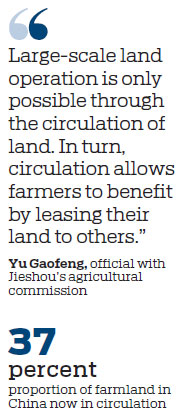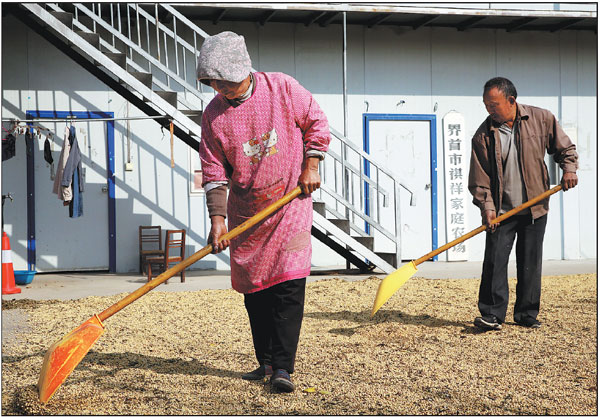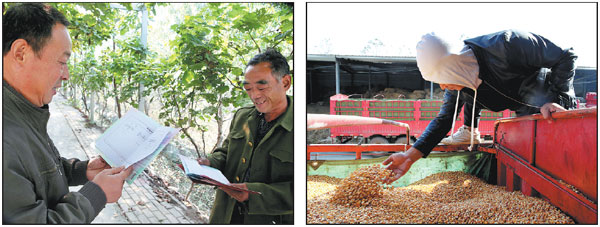Land circulation yields higher living standards
Farmers across the country are leasing their small plots of land to businesses to earn more money and improve their lives. Wang Xiaodong reports from Jieshou, Anhui.
For many decades, Zhang Zhigang labored on 0.2 hectares of land, growing wheat and corn to feed his family of four.
However, five years ago, he stopped working on the farm, when, along with many of his neighbors, he leased his plot to a horticultural company.
|
Zhang Zhigang and his wife dry soybeans in Jieshou, Anhui province. Photos by Feng Yongbin / China Daily |
|
Left: Villagers look through land certificates issued by the government in Jieshou's Bingji township. Right: A farmer checks corn kernels before taking them to be sold at the market in Jieshou. |
Having acquired a large area of land from residents of Sanhe, a village in Jieshou city, Anhui province, the company planted ginko saplings because the tree is a popular species for landscaping, while its fruit and leaves are used in traditional Chinese medicine.
The company pays Zhang 3,000 yuan ($437) a year for the use of his land, which is much more than he made by farming, and he earns an extra 40 yuan a day doing odd jobs for the company, such as spraying pesticide.
"Life is definitely better now I lease out my land, because I get a fixed income without the risk of droughts or floods," the 70-year-old said.
A growing number of farmers across China have abandoned agriculture and leased their land to commercial enterprises, which has freed them to do other work and raised their living standards.
By the end of September, 29,000 hectares of farmland in Jieshou was available for contracted use by individuals or businesses. The figure accounts for more than 75 percent of the city's farmland - higher than any other city in Anhui - according to the local agricultural commission.
The circulation of farmland, which resulted in small plots of land scattered among individual households being brought together under unified ownership, has greatly boosted economies of scale in agricultural production. In turn, that has generated more profits for the rural economy and contributed to the development of modern agriculture in the city, the commission said.
In early December, Zhang Hongyu, an official for the rural economy at the Ministry of Agriculture and Rural Affairs, said 37 percent of all farmland in China is now in circulation and is available for leasing.
A fresh start
Jieshou native Ren Tao used to own an umbrella factory in Shenzhen in the southern province of Guangdong. However, a few years ago, he decided to return to his hometown. He leased about 35 hectares of farmland in Jinzhai township, Jieshou, and started a cherry orchard in 2015.
Ren has signed 20-year contracts with about 300 households in five villages in Jinzhai, paying 12,000 yuan a year for each hectare of land he leases. His orchard provides jobs for 30 part-time workers.

He and his brother have invested 15 million yuan, including a subsidy of 1 million yuan from the local government, in the business.
"It usually takes between four and five years before cherry trees can produce fruit," he said. "If everything goes well, we may make annual profit of 15 million yuan from 2020."
To smooth the process, he has invited agricultural experts from the Shandong Academy of Agricultural Sciences, in the neighboring province, to provide technical guidance. He also plans to build a number of greenhouses to stabilize production.
Success is not assured, though. "A lot of uncertainties remain in agriculture, such as the weather, and market fluctuations are common so even if you have a good harvest you may not make money," he said.
Ren said he believes the rising affluence of the Chinese population means cherries have great potential in large cities, where they sell at several times the price of many other fruits.
Yu Gaofeng, an official with Jieshou's agricultural commission, said land circulation has led to an upsurge in modern agriculture in the area, such as Ren's orchard.
"The average amount of farmland per farmer in Jieshou is less than 1 mu (0.06 hectares) because of the high population density and scarcity of land," he said.
"Large-scale land operation is only possible through the circulation of land. In turn, circulation allows farmers to benefit by leasing their land to others."
The change has not only produced profits for businesses and local farmers, but also promoted recycling and reduced the environmental damage caused by traditional farming methods.
Environmental boost
Qi Gang grows corn and wheat on the 133 hectares of farmland he leases. He has also found new business opportunities in post-harvest waste, such as wheat and corn stubble, and corncobs.
"The dried stubble can be used to feed cattle, and (rotting) corncobs can be used to grow mushrooms," he said.
Every year after harvest, Qi sells 10,000 metric tons of wheat and corn stubble to factories that produce animal feed in Hunan and Hubei provinces. Whatever remains is processed into flammable fuel and sold to a plastics factory in Jieshou for 650 yuan a ton.
"Farmers used to abandon the stubble or burn it in the open air, which caused air pollution," he said. "But after processing, it makes a good replacement fuel for coal in factories."
In 1999, when he started leasing land from farmers to grow wheat and corn, he only had a few hectares, but in the years that followed, the amount he leased grew rapidly, he said.
Yu, from the Jieshou agricultural commission, said one of the main reasons for the increased circulation of farmland in the city is the certificates that have been issued to households in recent years to ensure people's property rights.
Since 2016, when the city began promoting the registration of farmland on a household basis, 138,000 certificates have been issued to cover every family in Jieshou's rural areas.
Before, the farmers lacked detailed records related to their land, which sometimes resulted in disputes between neighbors, even though most farmers only rented land to their friends or close family members, he said.
"There were a number of disputes, even among relatives, and some farmers who returned to their homes after spending years away in big cities discovered they could not reclaim their land because of a lack of documentation," Yu said.
The issuance of certificates has largely solved the problem.
"The certificate is like a property certificate for city residents," he said. "With the certificate, farmers have no worries when they rent out their land, and it also provides a guarantee for companies who lease land from the farmers."
Zhang Xingming, a farmer in Jieshou's Bingji township, received his land certificate in 2016.
The red booklet includes information such as the names of his family members and the area and boundaries of his land. "It's like an ID card for the land," he said.
His 0.2 hectare plot is leased to Sanxi Farm Corp, which grows fruit, such as peaches and pears. The company pays him 3,000 yuan a year, along with a smaller sum for helping to pick the fruit when it is ripe.
Across China, more than 80 percent of all farmland operated by farmers had been certified by the end of 2017, and the remainder was expected to be completed by the end of last year, according to the Ministry of Agriculture and Rural Affairs.
Zhu Chunxiu, head of the Sichuan Department of Agriculture and Rural Affairs, said the province completed certifying all farmland in April, and the work was supported by most of the farmers.
Zhang Hongyu, from the Ministry of Agriculture and Rural Affairs, said certifying farmland promotes land circulation and plays an essential role in developing the rural economy and carrying out the government's rural rejuvenation strategy.
The strategy, proposed by the top leadership in 2017, aims to modernize the rural areas and agriculture by 2035, and build a strong rural economy by 2050.
Large-scale production
As in many countries, China is headed for a situation when largescale agricultural production will prevail over household farms.
In many places, such as rural Shanghai, large-scale farming operations have resulted in higher profits for farmers, Zhang Hongyu said.
Now, more investment from a range of sectors - including property developers - is expected in farmland, which is a contentious issue for some people.
"We should stick to the principle that farmland should only be used for agriculture to ensure food security," Zhang Hongyu said.
Qi, the corn grower, said despite the higher profits generated by large-scale production, people are reluctant to expand operations for a number of reasons, including the high cost of leasing land from individual farmers, the rising cost of fertilizers and agricultural equipment, and a lack of irrigation systems that make farmland prone to drought or flooding.
He said more government support for agriculture is needed to encourage large-scale farming and promote modern agriculture.
"For example, sometimes a helicopter is needed to replace human labor and spray pesticides across farmland, but farmers need the government's assistance to find and rent the machines," he added.
Contact the writer at wangxiaodong@chinadaily.com.cn
(China Daily 01/09/2019 page5)




















